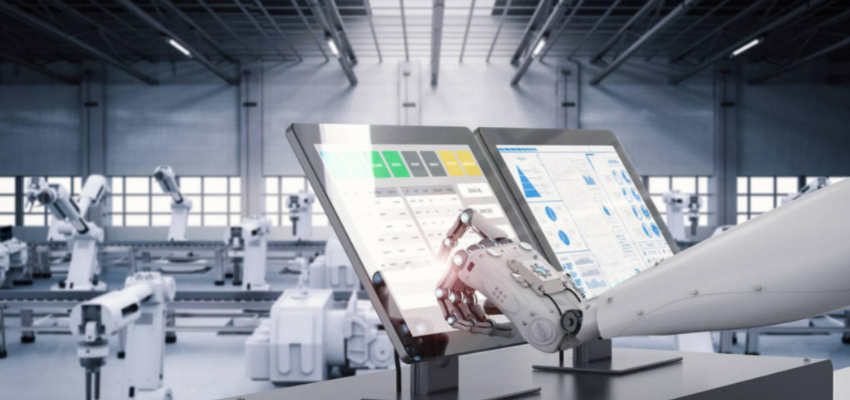Show:
The Benefits of Implementing Manufacturing Management Software in Your Factory
In today’s competitive market, factories continuously seek ways to optimize production, reduce costs, and improve efficiency. Manufacturing management software (MMS) offers a comprehensive solution that addresses these needs. By integrating MMS, production facilities can streamline operations, enhance productivity, and maintain a competitive edge. This post explores the key advantages of adopting MMS in industrial settings.

Enhanced Output
Integrating MMS can significantly improve efficiency in a production setting by automating tasks and streamlining, saving time, and enhancing accuracy in areas such as inventory management and material replenishment while minimizing errors. Managers can access real-time data to make decisions about production cycles and optimize scheduling, resulting in less downtime and increased output.
Enhanced Quality Assurance
Quality control is a crucial aspect of manufacturing operations. Manufacturing management software offers tools to oversee production processes to guarantee compliance with quality benchmarks. These mechanisms can identify variances in the production stages, preventing defective items from reaching customers. Continuous monitoring allows for real-time modifications to maintain product quality. By upholding strict standards, factories improve customer satisfaction and minimize wastage and expenses related to reworking.
Optimized Utilization of Resources
Resource management is vital in the operation of any factory. The insights provided by MMS greatly assist managers in making the best use of their workforce and equipment. Companies can pinpoint where resources are underutilized or overused by analyzing resource usage over time and making necessary modifications. Efficient resource management reduces expenses and protects equipment from premature wear and tear caused by excessive use.
Advanced-Data Analysis
Data-driven decision-making is essential in today’s manufacturing industry. MMS offers in-depth analytics that provides a comprehensive view of all production aspects. Managers can monitor performance metrics to spot trends and forecast requirements. This data empowers factories to adjust their strategies to meet market demands. Additionally, predictive analysis helps anticipate obstacles, enabling proactive risk management.

Ways to Lower Costs and Boost Profits
Cost-effectiveness is a key priority for manufacturing companies. The use of MMS technology helps lower labor expenses and reduces the likelihood of errors. Improved inventory management prevents overstock and shortages, saving storage costs and avoiding missed sales opportunities. Enhanced quality control reduces rework costs, while efficient resource allocation minimizes unnecessary spending. These combined benefits contribute to increased profitability and help maintain a competitive position in the market.
Ensuring Adherence to Regulations and Managing Risks
Following industry rules is crucial for running business operations. Manufacturing software helps maintain compliance by tracking required documentation, organizing records, and generating reports. These platforms help factories stay updated with evolving regulations, minimizing the chances of facing penalties. Furthermore, MMS systems assist in recognizing risks and proposing solutions. By sticking to regulations, factories safeguard their reputation and avoid legal troubles.
Achieving Growth and Adaptability
As companies expand their operations, their needs change accordingly. Manufacturing management solutions provide flexibility to grow in line with business requirements with business requirements. Whether it is enhancing production capabilities or venturing into markets, MMS is designed to adapt. This adaptability ensures that facilities can respond to changes without disruptions. By supporting growth in this way, MMS helps firms remain agile and competitive.
The Effects on the Environment and the Importance of Being Sustainable
Many industries now prioritize sustainability as a key focus in their operations. Manufacturing management systems play a crucial role in supporting these efforts through efficient resource utilization, waste reduction, and energy conservation strategies. By monitoring consumption trends, factories can adopt practices that align with environmental goals. These actions positively impact the environment and enhance the brand image by appealing to eco-conscious consumers.
Employee Involvement in the Workplace
Maintaining employee morale is essential for boosting workplace productivity. MMS offers tools that streamline tasks, reduce stress, and increase job satisfaction. Established communication channels foster a sense of connectivity among employees and enhance their engagement in responsibilities. The software’s training modules inform staff about procedures and help improve their skills.
Conclusion
Implementing software for managing manufacturing processes brings numerous benefits to factories aiming to streamline operations. These platforms offer practical solutions, with improved efficiency, quality monitoring, better resource utilization, and eco-friendliness among their advantages. By adopting this MMS approach, factories can gain a competitive edge while enhancing profitability and ensuring compliance with regulations. In essence, incorporating such technology fosters a manufacturing environment that is both efficient and innovative, benefiting the company as well as its employees.

 Return to Previous Page
Return to Previous Page








